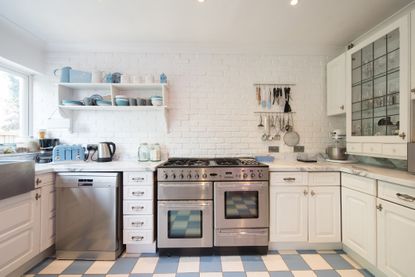How much do cooking appliances cost to run?
As high energy bills continue to impact many of us, the Energy Saving Trust reveals the average usage costs of common cooking appliances to help you make smarter decisions in the kitchen


Electric oven, hob, air fryer, slow cooker and microwave: how much do they cost to use and when's best to use them?
Many of us will be unsure about the energy our kitchen appliances use, not certain which is best for preparing different types of food, and how swapping one for another might affect our energy bills.
Most households are continually looking for ways to save amid high energy bills, expensive fuel costs and rising inflation.
Joanna O’Loan, at Energy Saving Trust, says: “Saving energy when cooking is all about using the best appliance for the job and this will depend on what you’re cooking and how many people you’re cooking for.
“There are ways to be more energy-efficient with whatever appliance you choose, from avoiding opening the oven door until the food is ready, to microwaving leftovers. All of these small changes can help reduce energy usage, cut carbon emissions and save money on your energy bills.”
We reveal the running costs for five popular cooking appliances as calculated by Energy Saving Trust, so you know which appliance to switch on when you’re preparing your next meal. Plus, we outline extra energy-saving tips when cooking in the kitchen.
Best for batch cooking: electric oven, typical cost per use of 27p
Ovens are generally bigger than other cooking appliances, meaning they require more energy to heat up. This means a typical electric oven can be the most expensive cooking appliance to run. However, their larger size means you can fit a lot of food in at once, so when cooking large quantities – for example, when batch cooking or cooking for a large group - using your oven could be the best value for money.
Look After My Bills Newsletter
Get the best money-saving tips, tricks and deals sent straight to your inbox every week. Make sense of your money in partnership with The Money Edit.
Top tip: Avoid opening the door any more than necessary while the oven is on to keep in hot air and reduce wasted energy.
Best for quick meals: gas or electric hob, typical cost per use 1p-2p
Using the hob is typically quite cheap, as generally you won’t need to have a hob on for very long to prepare meals, such as pasta or an omelette. Using a gas hob does produce more direct carbon emissions than an electric hob, so if you’re just using it to reheat a meal you might want to consider using a microwave instead in order to reduce your carbon footprint.
Top tip: Remember to cover your saucepan with a lid to keep heat in and reduce wasted energy.
Best for busy schedules: slow cooker, typical cost per use 26p
Designed to cook food gradually over a long period of time, slow cookers can be a convenient way to cook if you have a busy schedule. Think casseroles, stews and tagines, and in fact you can make most things in a slow cooker, from soup to cake.
Top tip: To save energy, try to avoid leaving them on longer than necessary or use a “low” setting if you’ll be out for longer.
Best for one or two people: air fryer, typical cost per use 7p
An air fryer works like a small conventional fan oven. Because of its small size, using an air fryer can often be cheaper than using your oven for the same meal. This makes it ideal for preparing smaller quantities of food, such as for one or two people.
For example, in a recent episode of Jamie Oliver’s “Jamie’s £1 Wonders”, it showed the comparative costs of two different ways to cook two salmon fillets - around 5p in an air fryer and 21p in an electric oven.
Top tip: Avoid opening the compartment any more than necessary to avoid letting out heat and wasting energy.
Best for reheating and quick cooking: microwave, typical cost per use 4p
Instead of heating the air, your microwave directly heats the food. This means your microwave will cook and reheat food very quickly and so its cost per use is likely to be lower than many other cooking appliances.
Top tip: If you’re preparing a large meal, batch cooking in a full oven and then reheating portions as you need them in the microwave is a good way to keep your energy bills down.
Read more
- Fresh vs frozen food - which is cheaper?
- Air fryer vs microwave - which one is cheaper to run?
- Is a dishwasher cheaper than hand-washing?
- Is a wood-burning stove cheaper than central heating?
- How to lower your boiler’s flow temperature and save £112 on your bills
- Will putting cling film on the window lower my energy bills?
Katie is staff writer at The Money Edit. She was the former staff writer at The Times and The Sunday Times. Her experience includes writing about personal finance, culture, travel and interviews celebrities. Her investigative work on financial abuse resulted in a number of mortgage prisoners being set free - and a nomination for the Best Personal Finance Story of the Year in the Headlinemoney awards 2021.
-
 Three energy firms pay £8m in switching compensation - has your provider paid out?
Three energy firms pay £8m in switching compensation - has your provider paid out?More than 100,000 customers have received compensation after changing providers, but is now a good time to switch energy suppliers?
By Tom Higgins Published
-
 Save £300 on your supermarket shop with cashback accounts
Save £300 on your supermarket shop with cashback accountsBanks, credit card companies and cashback sites are all offering cashback on your supermarket shop, but can you use them all to max out your savings?
By Vaishali Varu Published
-
 Three energy firms pay £8m in switching compensation - has your provider paid out?
Three energy firms pay £8m in switching compensation - has your provider paid out?More than 100,000 customers have received compensation after changing providers, but is now a good time to switch energy suppliers?
By Tom Higgins Published
-
 HMRC tax credit renewal packs: act quickly to avoid losing benefit payments
HMRC tax credit renewal packs: act quickly to avoid losing benefit paymentsHouseholds receiving tax credits will be asked to confirm their details to ensure they continue to receive their entitlement. Here’s everything you need to know to make sure you don’t miss out on up to £3,480 a year
By Tom Higgins Published
-
 Mobile provider rewards: how to earn up to £700
Mobile provider rewards: how to earn up to £700Your phone could be the key to unlocking hundreds of pounds worth of discounts and freebies that you don’t even know about. We reveal which mobile providers offer the best rewards
By Vaishali Varu Published
-
 Virgin Media leaves thousands without broadband: are customers entitled to compensation?
Virgin Media leaves thousands without broadband: are customers entitled to compensation?Tens of thousands of Virgin Media customers were hit by broadband outages yesterday. We explain your rights if your broadband goes down
By Katie Binns Published
-
 Broadband switching service delayed - how it will eventually work and why it’s crucial to switch
Broadband switching service delayed - how it will eventually work and why it’s crucial to switchA broadband switching service designed to make it easier to change to a cheaper or faster deal has been delayed. We explain how you can still avoid huge increases to your monthly internet bill
By Katie Binns Published
-
 Heat pumps: why you can claim a £5,000 government grant for longer
Heat pumps: why you can claim a £5,000 government grant for longerWhy you now have more time to apply for a government grant towards getting a heat pump in your home
By Sue Hayward Published
-
 British Gas cuts energy bills by £15 for prepayment meter customers from April
British Gas cuts energy bills by £15 for prepayment meter customers from AprilOne million British Gas customers on energy prepayment meters will save around £15 as British Gas cuts its penalty three months early
By Sue Hayward Published
-
 Missed payments at alarmingly high levels - how you can get help
Missed payments at alarmingly high levels - how you can get helpNew data shows the number of people struggling with debt has remained high in February and March. We explain how to get help
By Katie Binns Published